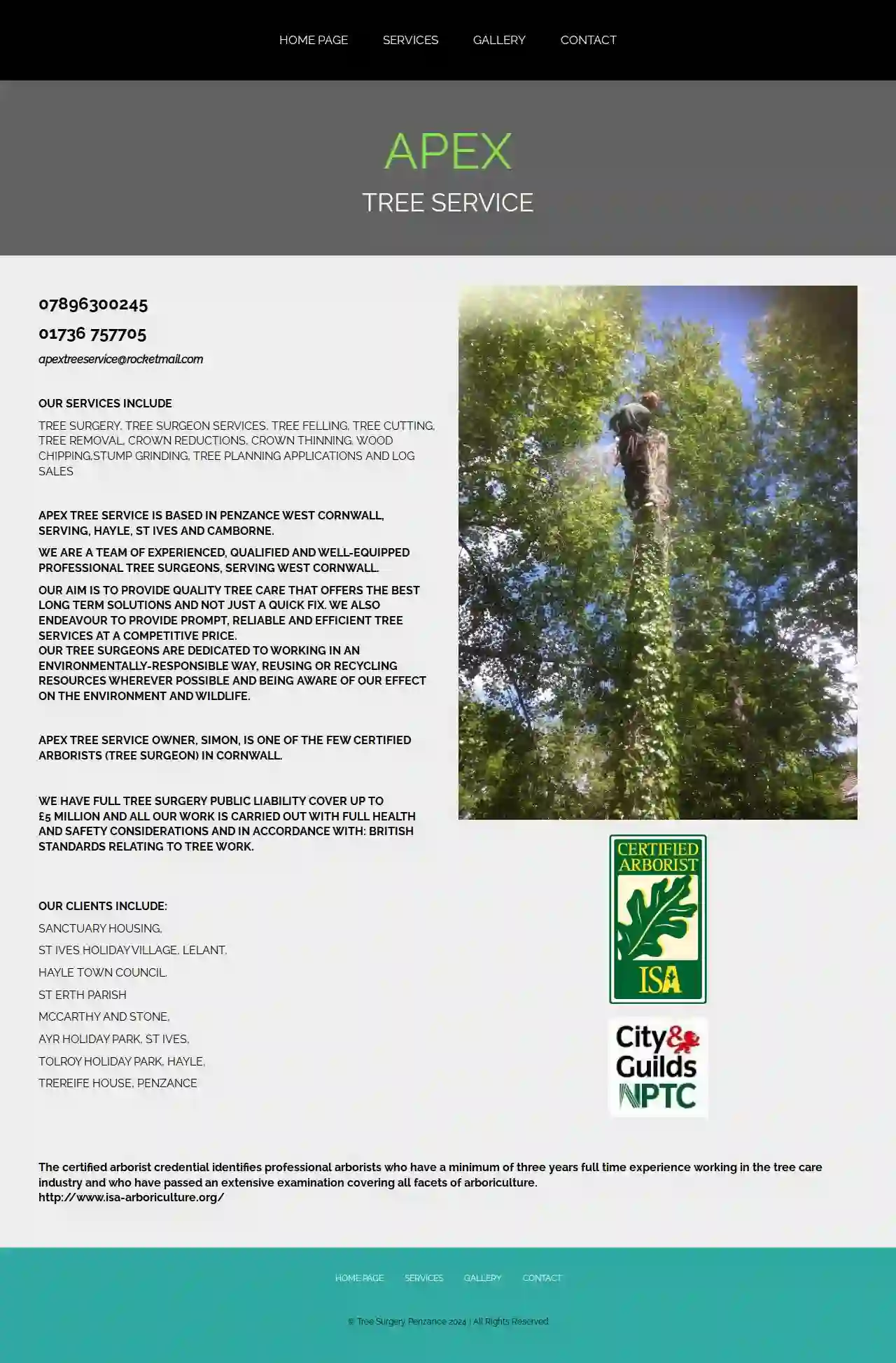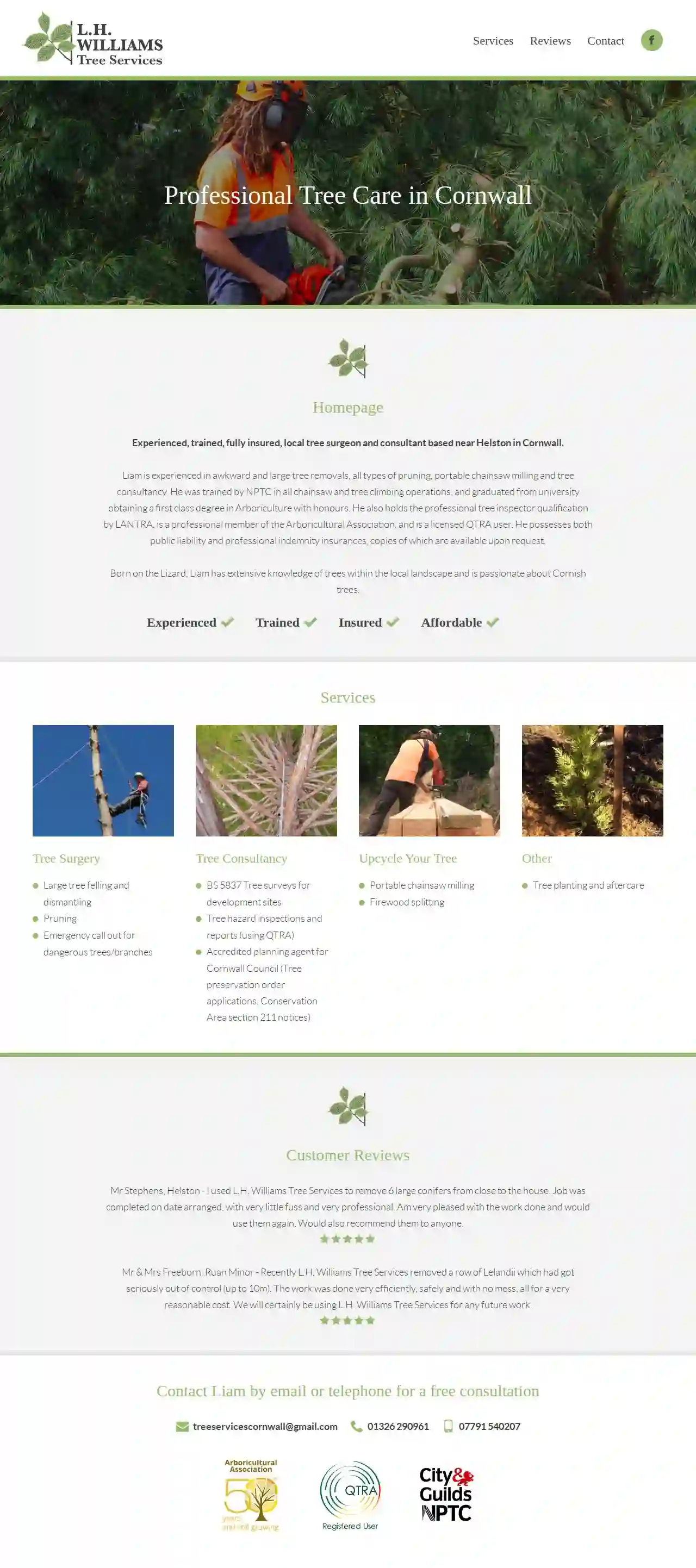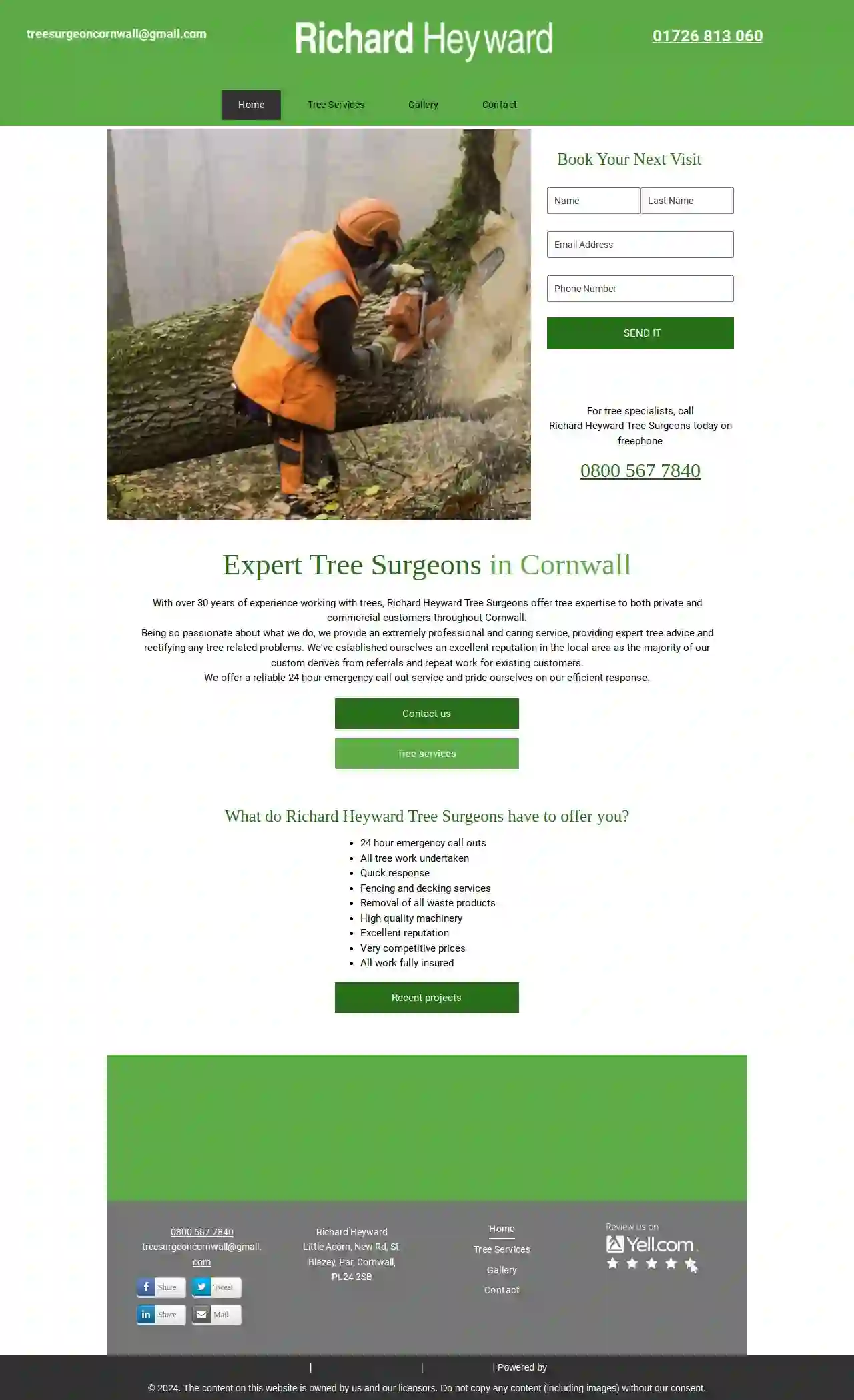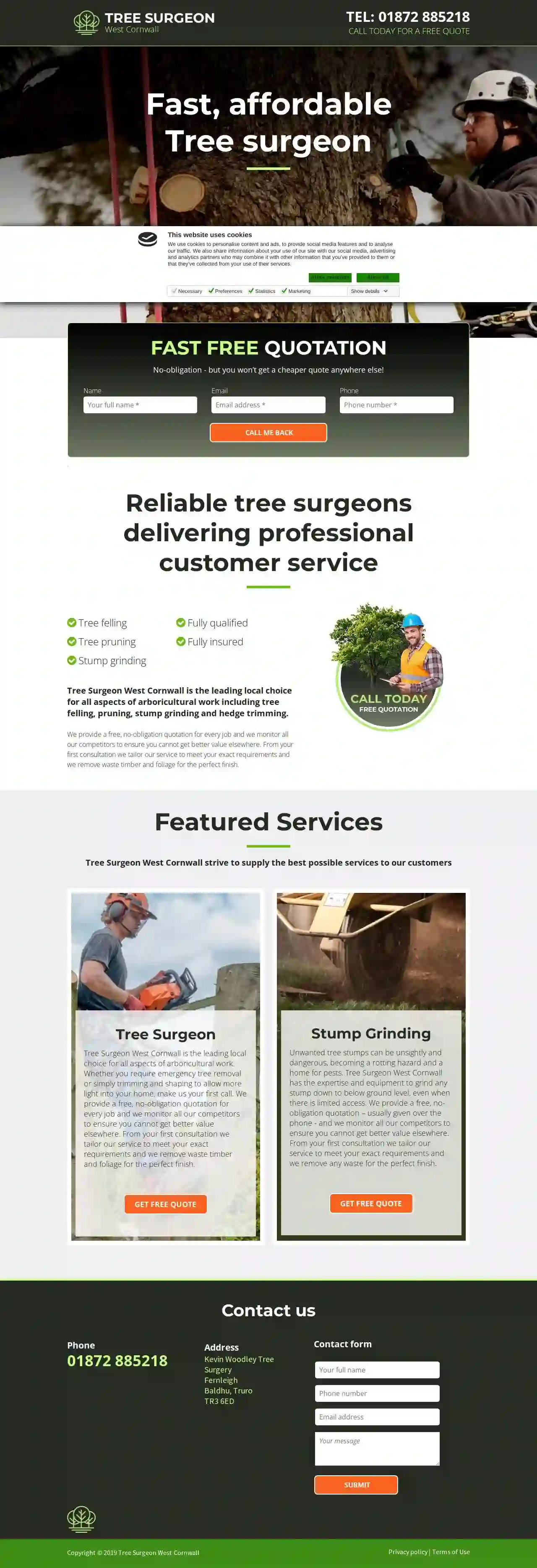Tree Surgeon Illogan
Find the best Tree Surgeons in Illogan
Get multiple Tree Surgeons quotes for your project today! Compare profiles, reviews, accreditations, portfolio, etc... and choose the best service.

Apex Tree Service
53 reviews2 Samson's Court, Connor Downs, Hayle, TR275LS, GBAPEX TREE SERVICE is based in Penzance, West Cornwall, serving Hayle, St Ives and Camborne. We are a team of experienced, qualified and well-equipped professional tree surgeons, serving West Cornwall. Our aim is to provide quality tree care that offers the best long term solutions and not just a quick fix. We also endeavour to provide prompt, reliable and efficient tree services at a competitive price. Our tree surgeons are dedicated to working in an environmentally-responsible way, reusing or recycling resources wherever possible and being aware of our effect on the environment and wildlife. APEX TREE SERVICE owner, Simon, is one of the few certified arborists (tree surgeon) in Cornwall. We have full tree surgery public liability cover up to £5 million and all our work is carried out with full health and safety considerations and in accordance with: British Standards relating to tree work. Our clients include: Sanctuary Housing, St Ives Holiday Village, Lelant, Hayle Town Council, St Erth Parish, McCarthy and Stone, Ayr Holiday Park, St Ives, Tolroy Holiday Park, Hayle, Trereife House, Penzance.
- Services
- Why Us?
- Accreditations
- Our Team
- Gallery
Get Quote
Lafrowda Tree Services
520 reviewsPenzance, Cornwall, UK, TR18 2DF, GBLafrowda Tree Services is a local family firm based in West Cornwall, covering Penzance, St.Ives, and surrounding areas. We are fully qualified NPTC arborist's carrying out all aspects of tree surgery from aerial works and felling to woodland management, tree planting, and all else in between. We are passionate about trees and their care. Based in Penzance with a yard near St.Just, we are the most westerly tree surgeons in the country. Local to the West Penwith area with previous experience across the U.K and beyond. We can assist with any Arboricultural needs required as well as Rope Access works. NPTC, City and Guilds Qualified. Local, Trusted, and Experienced. Fully Insured. We also stock a constant supply of quality seasoned firewood. All our firewood is sourced locally within a 10-mile radius of Penzance - We are fully licensed and Woodsure Approved.
- Services
- Why Us?
- Accreditations
- Our Team
- Gallery
Get Quote
Go Stump No Stump Ltd
Trelawney Industrial Estate, Unit 1, St Austell, TR1 1AA, GBWe are your first call for stump removal, tree removal, landscaping, ground works, block paving driveways and fencing across Cornwall. Established in 2002, Go Stump - No Stump Ltd have been meeting the needs of Cornwall's commercial and domestic customers with a service that is second to none. Select the service you require below for more information. By providing a no-nonsense, cost effective, professional and safe service our commitment to customers is guaranteed. Why not visit our testimonials page to see what our customers think of us. We pride ourselves in providing a clean and efficient service. We usually put the woodchips back into the hole leaving a level area for you to do turf over, seed or add topsoil for a flowerbed! We provide free estimates in person. So, whether you’re looking for a single stump removal or hundreds, or perhaps you want a new driveway, Go Stump – No Stump Ltd can help. Why not call us today?
- Services
- Why Us?
- Gallery
Get Quote
L.H. Williams Tree Services
4.914 reviewsTruro, GBExperienced, trained, fully insured, local tree surgeon and consultant based near Helston in Cornwall. Liam is experienced in awkward and large tree removals, all types of pruning, portable chainsaw milling and tree consultancy. He was trained by NPTC in all chainsaw and tree climbing operations, and graduated from university obtaining a first class degree in Arboriculture with honours. He also holds the professional tree inspector qualification by LANTRA, is a professional member of the Arboricultural Association, and is a licensed QTRA user. He possesses both public liability and professional indemnity insurances, copies of which are available upon request. Born on the Lizard, Liam has extensive knowledge of trees within the local landscape and is passionate about Cornish trees.
- Services
- Why Us?
- Accreditations
- Our Team
- Testimonials
- Gallery
Get Quote
Richard Heyward
51 reviewsNew Rd, St. Blazey, Little Acorn, PL24 2SB, GBWith over 30 years of experience working with trees, Richard Heyward Tree Surgeons offer tree expertise to both private and commercial customers throughout Cornwall. Being so passionate about what we do, we provide an extremely professional and caring service, providing expert tree advice and rectifying any tree related problems. We've established ourselves an excellent reputation in the local area as the majority of our custom derives from referrals and repeat work for existing customers. We offer a reliable 24 hour emergency call out service and pride ourselves on our efficient response. What do Richard Heyward Tree Surgeons have to offer you? 24 hour emergency call outs All tree work undertaken Quick response Fencing and decking services Removal of all waste products High quality machinery Excellent reputation Very competitive prices All work fully insured
- Services
- Why Us?
- Gallery
Get Quote
Tree Survey West Cornwall
51 reviewsBaldhu, Truro, Fernleigh, TR3 6ED, GBTREE SURGEON West Cornwall TEL: 01872 885218 CALL TODAY FOR A FREE QUOTE Tree Surgeon West Cornwall Fast, affordable Tree surgeons Fast, affordable Tree surgeon Button Button Button Button Button Button Button FAST FREE QUOTATION FAST FREE QUOTATION No-obligation - but you won’t get a cheaper quote anywhere else! Contact Us Name Email Phone Thank you for contacting us.We will get back to you as soon as possible Oops, there was an error sending your message.Please try again later Reliable tree surgeons delivering professional customer service Tree felling Tree pruning Stump grinding Fully qualified Fully insured Tree Surgeon West Cornwall is the leading local choice for all aspects of arboricultural work including tree felling, pruning, stump grinding and hedge trimming. We provide a free, no-obligation quotation for every job and we monitor all our competitors to ensure you cannot get better value elsewhere. From your first consultation we tailor our service to meet your exact requirements and we remove waste timber and foliage for the perfect finish. Featured Services Tree Surgeon West Cornwall strive to supply the best possible services to our customers Tree Surgeon Tree Surgeon West Cornwall is the leading local choice for all aspects of arboricultural work. Whether you require emergency tree removal or simply trimming and shaping to allow more light into your home, make us your first call. We provide a free, no-obligation quotation for every job and we monitor all our competitors to ensure you cannot get better value elsewhere. From your first consultation we tailor our service to meet your exact requirements and we remove waste timber and foliage for the perfect finish. GET FREE QUOTE Stump Grinding Unwanted tree stumps can be unsightly and dangerous, becoming a rotting hazard and a home for pests. Tree Surgeon West Cornwall has the expertise and equipment to grind any stump down to below ground level, even when there is limited access. We provide a free, no-obligation quotation – usually given over the phone - and we monitor all our competitors to ensure you cannot get better value elsewhere. From your first consultation we tailor our service to meet your exact requirements and we remove any waste for the perfect finish. GET FREE QUOTE Contact us Phone01872 885218 Address Kevin Woodley Tree Surgery Fernleigh Baldhu, Truro TR3 6ED Contact form FREE Report Name Phone Email Message: Thank you for contacting us.We will get back to you as soon as possible Oops, there was an error sending your message.Please try again later Copyright © 2019 Tree Surgeon West Cornwall Privacy policy | Terms of Use Share by:
- Services
- Why Us?
- Gallery
Get Quote
Arbtech Consulting Ltd
Unit 3 Well House Barns Chester, Chester, CH4 0DH, GBWe're Arbtech, the UK's leading ecology and arboriculture consultancy. We take complete ownership of your tree and ecology surveys, ensuring you get planning permission quickly and efficiently. Our friendly team of arboriculturalists and ecologists provide a comprehensive range of services, including tree surveys, biodiversity surveys, bat surveys, and more. With over 100 staff and nationwide coverage, we've supported over 50,000 projects since 2005. We're committed to providing unbeatable prices and a money-back guarantee, so you can buy with confidence.
- Services
- Why Us?
- Accreditations
- Gallery
Get Quote
Jakes Tree and Garden Services
52 reviewsTruro, GBWelcome to Cornwall Gardening Co, a trusted and reliable gardening services provider in Cornwall. Our members have many years of experience and an excellent reputation for our reliability and honesty. We offer a wide range of gardening, fencing, and pressure washing services, with friendly gardeners available up to 7 days a week. We provide accurate estimates via email and can accommodate fast and efficient lawn cutting, hedge trimming, weed control, power washing, and garden clearances. Our team is dedicated to providing top-notch services to ensure your garden looks its best all year round.
- Services
- Why Us?
- Gallery
Get Quote
Wild Arborist
511 reviewsTruro, GBWild Arborist specialise in low-impact approaches tending to trees and woodlands. We utilise traditional horse logging methods and a compact tractor to minimise the impact on woodland flora and fauna. Having invested in the best possible equipment, we can work quietly, safely and efficiently in any given environment. We are qualified to carry out large scale forestry contracts, woodland management, low-impact timber extraction, tree surgery operations, tree condition surveys and remedial work. We are fully insured and qualified, and most importantly - we love what we do.
- Services
- Why Us?
- Our Team
- Gallery
Get Quote
Kernow Tree Surgery
Truro, GBWelcome to Cornwall Tree Co, our panel of members have over many years experience undertaking tree surgery in Cornwall, our members knowledge of tree surgery and management is second to none. Working with residential, local authorities and commercial clients throughout Cornwall, they are proud to help manage the counties tree stock. Our members proudly serve Cornwall and surrounding areas. specialising in all tree services including tree removal, tree trimming, crown reduction, crown lifting, stump removal, hedge maintenance and much more. Our members are fully qualified, insured and have years of experience required to deliver the best tree services in Cornwall. Our panel of tree surgeons take pride in the work they do and keep up to date with the latest industry developments.
- Services
- Why Us?
- Gallery
Get Quote
Over 6,989+ Tree Surgeons in our network
Our tree removal pros operate in Illogan and beyond!
LocalTreeSurgeon has curated and vetted the Best Tree Surgeons arround Illogan. Find a reliable contractor today.
Frequently Asked Questions About Tree Services
- Extensive dieback: Large portions of the tree's crown are dead, with no signs of new growth.
- Severe bark damage: Large sections of bark are missing or severely damaged, exposing the inner wood.
- Root decay: Mushrooms or conks growing at the base of the tree, indicating fungal decay in the root system.
- Leaning precariously: The tree is leaning significantly and showing signs of instability.
- No leaves or buds: During the growing season, the tree is completely bare of leaves and shows no signs of new buds forming.
- Woodpecker holes: While a few woodpecker holes are not necessarily a cause for concern, numerous holes can indicate insect infestation or decay within the tree.
- Dormant Season (Late Fall to Early Spring): This is generally the best time to trim most deciduous trees (those that lose their leaves in fall) as they are not actively growing. Trimming during dormancy reduces stress on the tree and allows for better wound closure.
- Spring: Light pruning and shaping can be done in spring before the tree's leaves fully emerge.
- Summer: Trimming can be done in summer to remove dead or diseased branches. However, avoid heavy pruning during hot weather, as it can stress the tree.
- Fall: Some light pruning can be done in fall after the leaves have fallen, but it's best to avoid major pruning before winter.
- Tree Protection Zone (TPZ): Establish a designated area around the trees that is off-limits to construction activities. The size of the TPZ depends on the tree's size and species, but generally, it should extend to the drip line (the outermost edge of the tree's canopy).
- Root Protection: Avoid digging, trenching, or compacting the soil within the TPZ. If excavation is necessary, use hand digging or air spading to minimize root disturbance.
- Trunk Protection: Protect tree trunks from damage by wrapping them with protective barriers, such as burlap or plywood.
- Branch Protection: Avoid cutting or damaging branches unless absolutely necessary. If pruning is required, have it done by a certified arborist.
- Watering: Ensure trees receive adequate water during construction, especially if the soil has been disturbed or compacted.
- Monitoring: Regularly monitor trees for signs of stress or damage during and after construction.
- Shallow Soil: In areas with thin or compacted soil, roots may not be able to penetrate deeply and instead grow near the surface.
- Soil Compaction: Heavy foot traffic, construction activities, or vehicles can compact the soil, making it difficult for roots to grow downward.
- Low Oxygen Levels: Roots need oxygen to survive, and in poorly drained or compacted soil, they may grow near the surface to access more oxygen.
- Seeking Nutrients: Roots may grow towards areas with higher nutrient concentrations, which can be near the surface in some cases.
- Tree Species: Some tree species are naturally prone to surface roots, such as maples, willows, and poplars.
- Age: As trees age, their root systems expand, and some roots may naturally grow closer to the surface.
How do I know if a tree is dying?
What is the best time of year to trim trees?
What is the best way to protect trees during construction?
Why do tree roots grow above ground?
How do I know if a tree is dying?
- Extensive dieback: Large portions of the tree's crown are dead, with no signs of new growth.
- Severe bark damage: Large sections of bark are missing or severely damaged, exposing the inner wood.
- Root decay: Mushrooms or conks growing at the base of the tree, indicating fungal decay in the root system.
- Leaning precariously: The tree is leaning significantly and showing signs of instability.
- No leaves or buds: During the growing season, the tree is completely bare of leaves and shows no signs of new buds forming.
- Woodpecker holes: While a few woodpecker holes are not necessarily a cause for concern, numerous holes can indicate insect infestation or decay within the tree.
What is the best time of year to trim trees?
- Dormant Season (Late Fall to Early Spring): This is generally the best time to trim most deciduous trees (those that lose their leaves in fall) as they are not actively growing. Trimming during dormancy reduces stress on the tree and allows for better wound closure.
- Spring: Light pruning and shaping can be done in spring before the tree's leaves fully emerge.
- Summer: Trimming can be done in summer to remove dead or diseased branches. However, avoid heavy pruning during hot weather, as it can stress the tree.
- Fall: Some light pruning can be done in fall after the leaves have fallen, but it's best to avoid major pruning before winter.
What is the best way to protect trees during construction?
- Tree Protection Zone (TPZ): Establish a designated area around the trees that is off-limits to construction activities. The size of the TPZ depends on the tree's size and species, but generally, it should extend to the drip line (the outermost edge of the tree's canopy).
- Root Protection: Avoid digging, trenching, or compacting the soil within the TPZ. If excavation is necessary, use hand digging or air spading to minimize root disturbance.
- Trunk Protection: Protect tree trunks from damage by wrapping them with protective barriers, such as burlap or plywood.
- Branch Protection: Avoid cutting or damaging branches unless absolutely necessary. If pruning is required, have it done by a certified arborist.
- Watering: Ensure trees receive adequate water during construction, especially if the soil has been disturbed or compacted.
- Monitoring: Regularly monitor trees for signs of stress or damage during and after construction.
Why do tree roots grow above ground?
- Shallow Soil: In areas with thin or compacted soil, roots may not be able to penetrate deeply and instead grow near the surface.
- Soil Compaction: Heavy foot traffic, construction activities, or vehicles can compact the soil, making it difficult for roots to grow downward.
- Low Oxygen Levels: Roots need oxygen to survive, and in poorly drained or compacted soil, they may grow near the surface to access more oxygen.
- Seeking Nutrients: Roots may grow towards areas with higher nutrient concentrations, which can be near the surface in some cases.
- Tree Species: Some tree species are naturally prone to surface roots, such as maples, willows, and poplars.
- Age: As trees age, their root systems expand, and some roots may naturally grow closer to the surface.